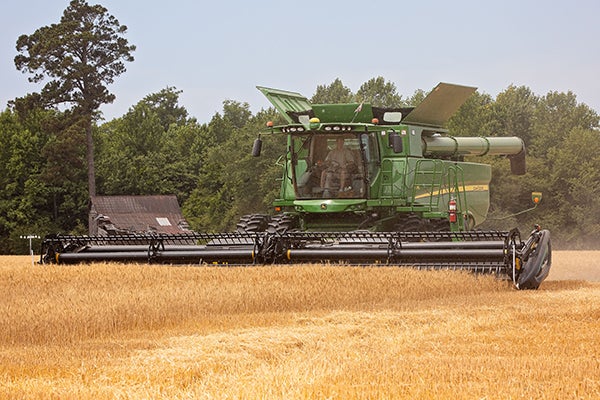ECU looks to become a link in eastern North Carolina’s agriculture chain
The markets, the workforce, the corporations, the regulations, the politics, the weather – always the weather – are just some of the reasons farming in eastern North Carolina is becoming more challenging every day.
That’s why farmers, farm advocates and experts at East Carolina University met again this week in the second round of discussions about ways to boost the region’s agricultural economy. And by the end of the day, the talk had turned to ECU’s core mission: education.
ECU data scientists – in association with N.C. State University and SAS – began a dialogue earlier this year with farmers, agriculture representatives and community stakeholders about the stressors affecting the state’s farming industry. The group first met in April and again Nov. 4.

Challenges facing farms and farmers were the topic of discussion during ECU’s Economic Growth Collaboratory on Nov. 4, at the East Carolina Heart Institute at ECU. (Photos by Cliff Hollis)
Of the nearly 40 participants, about half were returnees from April’s meeting. They are part of the university’s new Economic Growth Collaboratory.
A combination of a collaboration and a laboratory, a collaboratory can be described as an open, creative process where a group of people – stakeholders, scholars, consultants, students, industry experts and others – work together to generate solutions to complex problems.
In this case, the goal is to use big data and analytic tools to find new ways to alleviate issues faced by the region’s farming community.
“ECU is just a convener and facilitator to make sure we can get resources to support what is our biggest industry in our region,” said Jay Golden, ECU vice chancellor for research, economic development and engagement. “ECU can’t do this by itself.”
At Monday’s meeting, participants discussed supply chain and logistical challenges, food and crop commercialization, the potential of agricultural by-products such as biogas, and related topics.

Keith Purvis of Greenville Produce Co. works on a creativity exercise during the Economic Growth Collaboratory.
Tobacco is still the top cash crop in North Carolina, and the state ranks first in the country in tobacco production, according to the state and federal agriculture departments. North Carolina also leads the nation in sweet potato production and places in the top five in poultry and eggs, hogs and pigs, solid trout, turkey, cucumbers, strawberries, bell peppers, peanuts, and catfish production, according to federal statistics.
However, economic development leaders in eastern North Carolina have been looking for ways to attract new industries to the region and find untapped economic opportunities for farmers. Signs point to hemp being the next major tool in farmers’ economic toolbox. North Carolina created its Industrial Hemp Pilot Program in 2014, and state rules have been modified and updated since.The federal 2018 Farm Bill made it legal to grow hemp nationally.
Medicinal hemp oil and hemp fibers are just two of the products. State and federal laws prohibit growers from producing hemp with more than 0.3% tetrahydrocannabinol, so it is non-psychoactive. In other words, it’s not smokable marijuana.
“Who knows what that crop can hold?” said Keith Wheeler, ECU executive director of national security and industry initiatives, who led the discussion. “What can the new hemp crop do in the world?”
But new cash crops – the fiber plant kenaf being one – have come and gone while other issues continue. One that came up Monday was farm succession plans. “Every 65-year-old farmer is trying to save their farm for the next generation,” said Stacy Thomas, vice president of Ham Produce in Snow Hill.
From there, talk turned to how does ECU help attract young people into agricultural careers? After all, the university enrolls 12,000 students from rural areas – more than any other school in the University of North Carolina System – and many come from economically distressed counties.

Connie Ozment of Valley Proteins talks with Gerald Weckesser of ECU during the Economic Growth Collaboratory.
“Your location is perfect,” said Connie Ozment, a regional sales representative with Valley Proteins in Greensboro. “ECU has such an opportunity with your location. You have accessibility especially to the Tier 1 and Tier 2 schools.”
Overall, participants and leaders thought the day was a good one.
“We had a really diverse group, great perspectives, folks who are very passionate about these exact problems,” Wheeler said.
“Initially, I wasn’t sure what … the mission was going to be,” Ozment said. “I think we’re targeting into where ECU can be a piece of the puzzle for agriculture.”
For more information on the collaboratory or to explore potential partnership opportunities, contact Wheeler at wheelerch18@ecu.edu or 252-737-5569.
-by Doug Boyd, University Communications